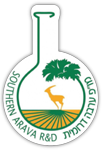Research: agro-ecological research, ecosystem services and disservices to agriculture
Researcher: Dr. rer. nat. Jessica Schäckermann, Scientist at the Agricultural R&D (MOP), the DSASC and manager of the Arava Long Term Socio Ecological Research Platform
Agro-ecology deals with all ecological topics connected to agriculture. Two of these topics include how to use and improve ecosystem services for agriculture and how to avoid ecosystem disservices. Ecosystem services to agriculture include biological pest control and wild pollination and crop predation by wild animals is an example for ecosystem disservices. The Agriculture R&D is part of the research community surveying these services and disservices. It is my role to make the agro-ecological research of biological pest control and wild pollination as applicable as possible to the farmers of the southern Arava.
The date plantations in the Arava suffer from crop damage due to the lesser and the greater date moth. Both of these moths can destroy large amounts of the date fruits. Night active, insectivorous bats might mitigate this disservice by predating on the moths and therefore are considered ecosystem service agents. A project evaluating the potential and impact of bats as pest control agents in dates in the Arava is ongoing in cooperation with Prof. Carmi Korine from the Ben Gurion University of the Negev.
In another project, Noam Weiss and his team of the International Birding and Research Center Eilat are helping me to investigate the positive pest control services by migratory and non-migratory birds in onion, pumpkin and melon fields in the southern Arava. Different kinds of insect pests are targeted by insectivorous birds and we are looking into which habitat structures support the birds and hence attract them to the fields.
Improving wild pollination for agriculture in a desert environment is a challenging topic, which makes it all the more interesting. As part of a study with Dr. Avigail Morris and Dr. Racheli Armoza-Zvuloni about the effects of floods in the Arava, I am investigating the potential of naturally occurring desert plant species to attract wild pollinators. Seeds of effective plants will be collected and then used in flowering strips next to agricultural fields in order to attract the necessary wild pollinators for crop pollination.
I am also participating in another study, led by Dr. Malkie Spodek, about the control of the strangle vine in date plantations and other agricultural crops.

